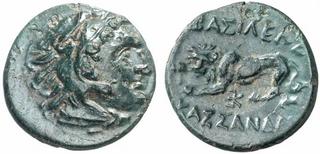Related Research Articles
This article concerns the period 319 BC – 310 BC.
Year 317 BC was a year of the pre-Julian Roman calendar. At the time, it was known as the Year of the Consulship of Brutus and Barbula. The denomination 317 BC for this year has been used since the early medieval period, when the Anno Domini calendar era became the prevalent method in Europe for naming years.
Year 316 BC was a year of the pre-Julian Roman calendar. At the time, it was known as the Year of the Consulship of Rutilus and Laenas. The denomination 316 BC for this year has been used since the early medieval period, when the Anno Domini calendar era became the prevalent method in Europe for naming years.
Year 313 BC was a year of the pre-Julian Roman calendar. At the time, it was known as the Year of the Consulship of Cursor and Brutus. The denomination 313 BC for this year has been used since the early medieval period, when the Anno Domini calendar era became the prevalent method in Europe for naming years.

Antigonus I Monophthalmus was a Macedonian Greek general and successor of Alexander the Great. A prominent military leader in Alexander's army, he went on to control large parts of Alexander's former empire. He assumed the title of basileus (king) in 306 BC and reigned until his death. He was the founder of the Antigonid dynasty, which ruled over Macedonia until its conquest by the Roman Republic in 168 BC.

Cassander was king of the Ancient Greek kingdom of Macedonia from 305 BC until 297 BC, and de facto ruler of southern Greece from 317 BC until his death.

Alexander IV, sometimes erroneously called Aegus in modern times, was the son of Alexander the Great and Princess Roxana of Bactria.

Antipater was a Macedonian general and statesman under the successive kingships of Philip II of Macedon and his son, Alexander the Great. In the wake of the collapse of the Argead house, his son Cassander would eventually come to rule Macedonia as a king in his own right.

The Diadochi were the rival generals, families, and friends of Alexander the Great who fought for control over his empire after his death in 323 BC. The Wars of the Diadochi mark the beginning of the Hellenistic period from the Mediterranean Sea to the Indus River Valley.

The Wars of the Diadochi, or Wars of Alexander's Successors, were a series of conflicts fought between the generals of Alexander the Great, known as the Diadochi, over who would rule his empire following his death. The fighting occurred between 322 and 281 BC.

Eumenes was a Greek general and satrap. He participated in the Wars of Alexander the Great, serving as both Alexander's personal secretary and as a battlefield commander. He later was a participant in the Wars of the Diadochi as a supporter of the Macedonian Argead royal house. He was executed after the Battle of Gabiene in the winter of 316–315 BC.
Polyperchon, was a Macedonian Greek general who served both Philip II and Alexander the Great and then played an active role in the ensuing battles for control between Alexander's generals.
Cleitus (Clitus) the White was an officer of Alexander the Great surnamed "White" to distinguish him from Cleitus the Black. He is noted by Athenaeus and Aelian for his pomp and luxury, and is probably the same who is mentioned by Justin among the veterans sent home to Macedonia under Craterus in 324 BC.
Nicanor was a Macedonian officer who served the Diadochus Cassander and the son in law of Aristotle. He campaigned on Cassander's behalf in Attica and Hellespont during the early Wars of the Diadochi, but was executed by Cassander after the latter suspected him of plotting a coup.
Alexander was a son of Polyperchon, the regent of Macedonia, and an important general in the Wars of the Diadochi.
The Second War of the Diadochi was the conflict between the coalition of Polyperchon, Olympias and Eumenes and the coalition of Cassander, Antigonus, Ptolemy and Lysimachus following the death of Cassander's father, Antipater.
The Battle of Orkynia was fought in 319 BCE near Orkynia in Cappadocia. It was one of first battles of the wars between the successors to Alexander the Great, the so called Diadochi. At Orkynia the armies of Antigonus Monophthalmus and Eumenes the Cardian met; the battle resulted in a stunning Antigonid victory.
The Battle of Cretopolis (Kretopolis) was a battle in the wars of the successors of Alexander the Great between general Antigonus Monopthalmus and the remnants of the Perdiccan faction. It was fought near Cretopolis in Pisidia in 319 BC and resulted in another stunning Antigonid victory.
The Battle of Byzantium (Byzantion) took place during the wars of the successors of Alexander the Great between the generals Antigonus Monopthalmus and Cleitus the White. It was a two-day-battle fought near Byzantium at the Hellespont in 317 BC and resulted in a stunning Antigonid victory.
The siege of Megalopolis was a siege battle during the Second War of the Diadochi between Polyperchon, the Regent of the Macedonian Empire, and the people of Megalopolis who supported Polyperchon's rival Cassander. The siege failed and Polyperchon lost a lot of prestige, which was capitalized on by Cassander and his ally Antigonus.
References
- ↑ Diod. XVIII 40–41.
- ↑ Diod. XVIII 41,1–3; Plut. Eum. 9,2.
- ↑ Diod. XVIII 45.
- ↑ "Antipater - regent of Macedonia". Encyclopedia Britannica. Retrieved December 3, 2017.